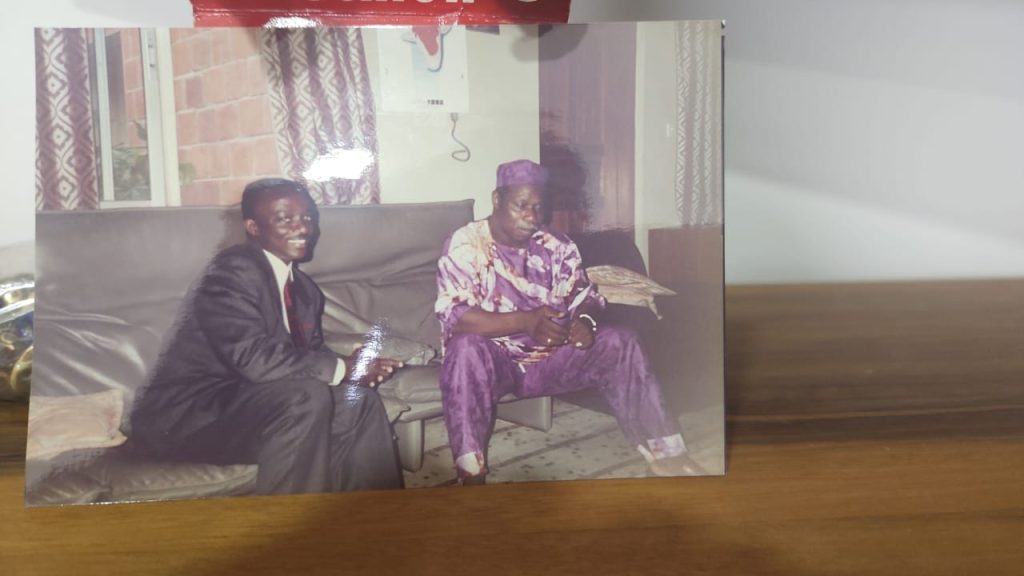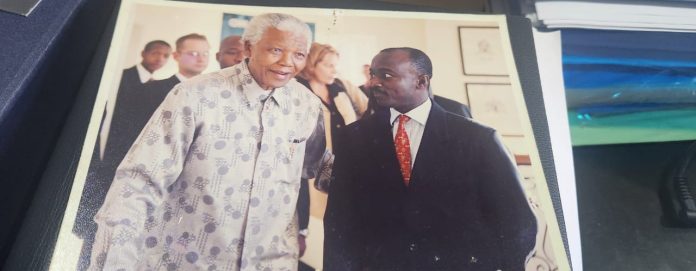Photo above: The writer with former President Nelson Mandela
In 1994, the world watched as South Africa emerged from apartheid to embrace democracy. Nelson Mandela, a symbol of resilience and hope, became the first black president, embodying the aspirations of millions globally. The transition was more than political; it was the dawn of a new era. However, 30 years later, with optimism shattered, South Africa grapples with problems similar to many African countries. The big question is: what went amiss?
I recall a conversation on January 10, 1994, with then-President F.W. de Klerk at the Union Buildings in Pretoria. His optimism was striking. He suggested that sooner than expected, black South Africans would yearn for a white government again. To him, political power was being ceded temporarily while economic dominance remained with whites and a few fortunate blacks. This strategy, he believed, would enable a resurgence of white political influence in South Africa and beyond the Limpopo River. At the time, I dismissed his views as overly cynical and patronizing. However, the events of the last decade and a half have made me reflect deeply on his words. How could he have been so right? The changes he talked about are happening during my lifetime, to my utter shock. The agreement he struck with the ANC, which the world applauded and rewarded with a Nobel Peace Prize for him and Nelson Mandela, was structured to give the ANC temporary political power while whites kept economic power. This realignment of economic priorities, entrenched with money-making, cronyism, corruption, and materialism, began to eat deep into the political fabric of the ANC.
For me, as someone who participated in the events of 1994 with so much hope, last week’s elections in South Africa have been disheartening. The African National Congress (ANC), once the beacon of hope for millions, is now a fractured entity struggling to maintain its relevance. The cracks in the ANC mirror a broader malaise affecting not just South Africa but the entire African continent. Many African countries embraced democratic governance with renewed hope in the 1990s and early 2000s. But today, most of our democracies are failing, economies are in tatters, and hopelessness is growing across the continent. The statement Osagyefo Dr. Kwame Nkrumah boldly made on March 6, 1957, looms large: “The black man is capable of managing his own affairs.”
Over the past twenty years, the promise of 1994 has steadily dissipated. Corruption, mismanagement, and sickening opulence flaunted in front of poverty-stricken people who are only remembered at election time when they are given T-shirts, token amounts stashed in matchboxes, and, if lucky, a food parcel, have plagued the ANC. This has led to growing disillusionment among South Africans, particularly the black youth. The economic disparities that apartheid entrenched have not been adequately addressed, and for many, the dream of equality remains just that—a dream. Unemployment is rampant, at over 50% in most African countries, including South Africa, among the youth, and opportunities are scarce, feeding into a cycle of frustration and despondency.
The South African disappointment is palpable across many African countries. The youth across Africa are losing faith in their leaders and institutions. The frustration is spreading, and with it, the belief that African nations might never fully realize their potential. South Africa’s predicament should serve as a wake-up call to the continent’s politicians and elites. The legacy of colonialism and apartheid cannot be an eternal excuse for the failures of governance and leadership. It is imperative for African leaders to adopt a forward-looking approach, addressing the root causes of discontent and striving to fulfill the promises made to their people.
Despite the grim picture, there is still hope. The youth, though disillusioned, are also resilient and innovative. They are the key to Africa’s future. To harness this potential, African governments must prioritize education, job creation, and good governance. Transparency and accountability should be the cornerstones of governance. Corruption must be tackled head-on; perpetrators punished and jailed, and their loot seized and returned to the state. Resources should be equitably distributed to ensure that all citizens benefit from the continent’s wealth.
Furthermore, it is crucial to foster a sense of unity and purpose. Political leaders should rise above rivalries and work collaboratively towards the common good. The African Union and other regional bodies have a significant role to play in mediating conflicts and promoting peace and stability.

Photo: With OBJ in 1993 at his farm in Ota a few months before the annulment of the June 12 elections
In conclusion, the ANC’s struggles are a microcosm of broader challenges facing Africa. The optimism of 1994 may have dimmed, but it has not been extinguished. As we reflect on the lessons of the past, let us reignite the spirit of hope and determination that once propelled us towards freedom. African leaders must seize this moment to make meaningful changes, ensuring that the sacrifices of the past were not in vain and that the dreams of the future can still be realized.
The journey ahead is fraught with challenges, but with collective effort and unwavering resolve, Africa can rise to meet them. It is time for a renewed commitment to the ideals of justice, equality, and prosperity for all. Let the recent elections in South Africa be a clarion call to action, reminding us that the future of our continent lies in our hands.
Ambassador Edward Boateng
Ghana
The writer was previously Ghana’s Amb to China, Head of CNN in Africa and an accomplished entrepreneur.




